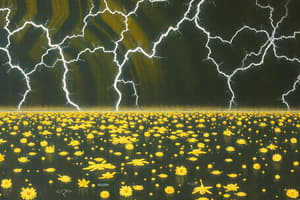Podcast
Questions and Answers
What type of force is experienced when opposite charges interact?
What type of force is experienced when opposite charges interact?
- Repulsive force
- Attractive force (correct)
- Gravitational force
- Frictional force
In the context of electric charge, what causes the phenomenon of static electricity?
In the context of electric charge, what causes the phenomenon of static electricity?
- Flow of free electrons
- Conductivity of materials
- Excess charge buildup (correct)
- Movement of protons
What does Coulomb's law describe?
What does Coulomb's law describe?
- The phenomenon of magnetic induction
- The behavior of electric fields in matter
- The electrostatic force between two point charges in vacuum (correct)
- The relationship between charge and current
Which law is concerned with the behavior of electric charges at rest?
Which law is concerned with the behavior of electric charges at rest?
What is responsible for creating an electrical current?
What is responsible for creating an electrical current?
Which concept is related to the work done to move a unit positive charge from one point to another in an electric field?
Which concept is related to the work done to move a unit positive charge from one point to another in an electric field?
According to Coulomb's law, if the distance between two point charges is doubled, the electrostatic force between them will:
According to Coulomb's law, if the distance between two point charges is doubled, the electrostatic force between them will:
Gauss's law relates the total electric flux through a closed surface to:
Gauss's law relates the total electric flux through a closed surface to:
If the electric field strength at a point is zero, it implies that:
If the electric field strength at a point is zero, it implies that:
The electric potential at a point in space is determined by:
The electric potential at a point in space is determined by:
If the electric potential difference between two points is zero, it implies that:
If the electric potential difference between two points is zero, it implies that:
According to Gauss's law, if the total charge enclosed within a closed surface is doubled, the total electric flux through the surface will:
According to Gauss's law, if the total charge enclosed within a closed surface is doubled, the total electric flux through the surface will:
Study Notes
Introduction
Electricity is one of the most fundamental forces in nature that plays a crucial role in our everyday life. It is responsible for numerous phenomena such as lightning, static electricity, and even the functioning of electronic devices like computers and smartphones. At its core, electricity is all about the movement of charged particles called electrons. In this article, we will delve into the fascinating world of electrostatics, which deals with the behavior of electric charges at rest. We will discuss various concepts related to electric charges, including Coulomb's law, Gauss's law, electric fields, and electric potential.
Electric Charge
Electric charge is a property of matter that causes it to experience a force when it comes into contact with other charged material. There are two types of electric charges: positive and negative. Opposite charges attract each other, while like charges repel each other. The flow of free electrons from one conducting material to another is what creates an electrical current. This transfer of charge can result in the buildup of excess charge on the surface of materials, leading to the phenomenon known as static electricity.
Coulomb's Law
Coulomb's law describes the electrostatic force between two point charges in vacuum. It states that the magnitude F of the electrostatic force between two point charges q₁ and q₂ is directly proportional to the product of their charges and inversely proportional to the square of the distance r between them:
F = k \cdot \frac{q₁ \cdot q₂}{r²}
Here, k is a constant that relates the force F to the charge q₁ and distance r between them. This law holds true under vacuum conditions, where there are no other charges present to affect the interaction between two charged bodies. In real-world situations, however, other factors such as the presence of dielectric materials may alter the force between charges.
Gauss's Law
Gauss's law is another fundamental principle in electrostatics that deals with the distribution of electric flux in space. It states that the total electric flux through any closed surface is proportional to the charge enclosed by the surface:
\oint_S E \cdot dA = Q / \varepsilon_0
In this equation, E represents the electric field vector, dA represents the infinitesimal area element on the closed surface S, and Q is the total charge enclosed within the surface. The constant ε₀ is called the permittivity of free space, which has a value of approximately 8.85 x 10^-12 C² N^-1 m^-2.
Electric Field
An electric field is a region around a charged object in which other charged particles experience a force due to the presence of the charged object. The electric field E is a vector field that describes the force experienced by a test charge q placed within the field:
F = q \cdot E
The direction of the electric field vector E is defined as the force that a positive test charge would experience if placed at that point in space. Electric fields can be generated by various sources, including charged particles, electric current, and electric potential differences.
Electric Potential
Electric potential, also known as electrostatic potential, is a scalar quantity that describes the electric potential energy per unit charge of a point charge at rest. It is measured in volts (V) and is defined as the work done per unit charge required to move a positive point charge from infinity to a specific location:
V = \frac{W}{q}
The electric potential difference between two points in space is equal to the work done per unit charge required to bring a positive test charge from one point to the other. Electric potential differences are also known as voltages, and they play a crucial role in determining the direction and magnitude of electric current flow through conducting materials.
In conclusion, electostatic phenomena are essential concepts in understanding how electricity behaves and interacts with matter. By studying electric charges, Coulomb's law, Gauss's law, electric fields, and electric potential, we gain insights into the forces that govern the behavior of charged particles and their interactions with each other. These principles have numerous applications in various fields, including electronics, telecommunications, and even weather forecasting.
Studying That Suits You
Use AI to generate personalized quizzes and flashcards to suit your learning preferences.
Description
Test your knowledge on electrostatics, including electric charges, Coulomb's law, Gauss's law, electric fields, and electric potential. Explore the fundamental principles that govern the behavior of charged particles and their interactions in this quiz.




